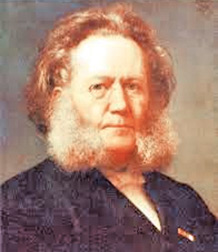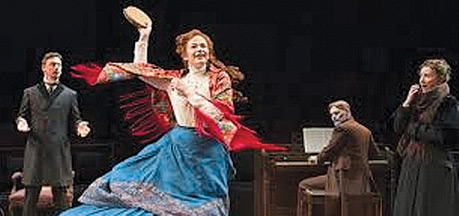|
Henrik Ibsen:
Exploring the dark recesses of human psyche
by W.T.J.S. Kaviratne Ambalangoda Spl. Cor.
Henrik Johan Ibsen was born in Skien, Telemark county, Norway on
March 20, 1828.
|

Henrik Ibsen |
His father Knud Ibsen was a timber merchant and Marichen Cornelia
Martie Altenburg was his mother.
Henrik Ibsen was the eldest of five children of the family and his
ancestors were rich merchants and sea captains.
Ibsen's family had to face financial constraints when he was seven
years old and their family was forced to leave for a farm in Grimstad.
Henrik Ibsen was a playwright, a poet and a theatre director.
Ibsen had written 26 plays and a volume of poetry and A Doll's House,
Brand, Peer Gynt, Hedda Gabler, Ghosts and The Wild Duck became very
popular among Ibsen's plays and considered as the most performed plays
after Shakespeare.
The majority of the themes of his plays depict the issues on
marriage, debt, society and independence having a closer resemblance to
the problems encountered by Ibsen himself and his family.
Father of Realism
Ibsen was also known as the 'Father of Realism' due to his realistic
approach in the exposure of the reality of the societal issues of Europe
during the Victorian era through the portrayal of numerous characters in
his plays.
Ibsen's transition from Romanticism to Realism paved him the
opportunity to expose realistically the emotions of the Individuals
suppressed by those members of the society who advocated the false
values of dignity, statues and traditions.During the era plays were
meant only to provide superficial entertainment and not to stage plays
exposing social issues of the nature of the themes identified by Ibsen.
For his plays Henrik Ibsen was severely criticised by the literary
critics of the Victorian age for his analytical exposure and the
scathing criticism of the institution of marriage when in reality the
women have become silent sufferers under the whims and fancies of their
husbands.
Pessimist
When Ibsen was branded as a pessimist for exposing hypocrisy,
deception and immoral behaviour portrayed through the characters of his
plays belonged to the so-called higher echelons of society, Ibsen
reacted stating that, 'the human nature has dark recesses which must be
explored and illuminated, life has pitfalls which must be recognised to
be avoided, and society has humbugs, hypocrites and obscure diseases
which must be revealed before they can be cured and recognising these
facts is not pessimism .
It is the moral obligation laid upon intelligent people.'
'Nora' the protagonist and the heroine of' Doll's House' could be
identified as one of the major forerunners of female liberation who
voiced her opinions relevant to women's rights vividly and realistically
portrayed by Henrik Ibsen.
Referring to the independence of women during the Victorian era Ibsen
said' It is an exclusively masculine society with laws written by men
and with prosecutors and judges who regard female conduct from masculine
point of view.'
Doll's House
Nora's husband Torvald Helmer said Nora had fulfilled her duty as a
wife and mother.
Nora : 'You've always been so kind to me.
|

A scene from Dollís House |
But our home has been nothing but a play-room.
I've been your doll-wife here, just as at home I was Papa's
doll-child.
And the children have been my dolls in their turn.
I liked it when you came and played with me, just as they liked it
when I came and played with them.
That's what our marriage has been ,Torvald.'
Nora told her husband Torvald Helmer that she was leaving him alone
so that she could find out who she was and what she believed and decide
what to do with life.
Nora : 'There's another task that I must finish first-I must try to
educate myself. And you are not the man (Torvald Helmer) to help me with
that; I must do it alone.
That's why I'm leaving you.' Nora had come to the conclusion that her
husband Torvald had been selfish and hypocritical and paid undue
attention on his public reputation throughout their eight long years of
marriage.
By creating the play A Doll's House Ibsen's motive was to expose how
women of the era suffered psychologically and the manner their potential
and development was retarded, twisted and ignored as insignificant which
Ibsen considers as a consequence of the male domination.
Torvald Helmer could be identified as a representative portraying the
patriarchal society of the 19thcentury Europe.
This notion is of universal significance and not confined only to the
era of Henrik Ibsen and relevant to all cultures and nations across the
world.
Ghosts
Hypocrisy, deception and pretension are some of the devices exploited
to hide the true nature of human actions.As a realist Henrik Ibsen
resorted to the task of writing plays exposing the impact of these on
the individuals and society.
The character of the play Ghosts Helen Alving planned to dedicate an
orphanage in the memory of her dead husband Captain Alving and she
revealed to her spiritual advisor Pastor Manders that she had hidden the
evils of her marriage.She said she wanted to prevent their son Oswald
inheriting anything from her husband.
Captain Alving the wife of Helen Alving was a notorious philanderer
but she was advised on a previous occasion by Pastor Manders to continue
her life with her husband. She followed the advice of Pastor Manders but
her husband continued his philandering until his death. As a
precautionary measure to prevent her son getting corrupted by his father
she sent her son Oswald away but later she found he had already
inherited syphilis from his father.
Helen Alving took great pains to hide the immoral behaviour of her
husband both to the society and her son and to protect her husband's
dignity but finally she felt guilty conscious for not exposing the
reality.
|

Ibsen museum |
But Helen Alving continued to deceive the society by building an
orphanage in memory of her husband as a hero even if he was a morally
degenerated character.
Henrik Ibsen through his play Ghosts convinced the world that the
majority of those who posed as saints are actually immoral and corrupt
in their real life and hypocrisy is an inherent trait found in the
majority of the individuals in human society.
Hedda Gabler
Hedda Gabler Tesman is the main character and the heroine of the play
Hedda Gabler and Hedda appears to be just the opposite of other female
characters of Ibsen's plays.
Ibsen portrayed the female quest for power and to be free from the
shackles of husbands and the conventions of society by his play Hedda
Gabler.
Hedda was newly married to George Tesman and academic who was more
interested in his research on' Domestic Industries of Medieval Brabant'
than in his newly married wife.
Even during their honeymoon trip George Tesman never forgot to visit
many of the libraries for his Research and was in the habit of keep on
talking about the subject which proved to be boring for Hedda.
Just like Nora's husband Thorvald Helmer in Doll's House, George
Tesman was of the opinion the role of a husband is just to meet the
domestic requirements of his wife so can she be happy in the confines of
her home.
Besides, he thought after the marriage a woman automatically becomes
part and parcel of the routine of the day to day activities of her
household.
George was not intelligent enough to realise the temperament of his
wife Hedda.
Hedda was disgusted of her marriage from the very beginning.
Female characters or other plays depicted as victims of patriarchal
society.
But in the play Hedda Gabler Ibsen made her to overcome the pressures
of society and to seek independence without adjusting to the norms of
the society.
During the period when Ibsen was writing the play Hedda Gabler women
were divided into two groups as 'Old Women' and 'New Women'. Hedda
Gabler belonged to the group of, New Women ' who were struggling to
break away from the pressures and limits of the society.
The women belonged to the group of' Old Women' affected for ever from
silent suffering and they believe in self sacrifice and consider the
duty of women was sexuality and in terms of child-bearing. Finally the
play ended with the deaths of both Hedda and her former admirer Lovborg
in tragic manner.
League of Youth
League of Youth' is a play of political satire written by Ibsen and
its main character Stensgard is a hypocrite and an opportunist and
deceptive in his dealings.
During his election campaign in a small provincial town held in
Norway using his rhetoric he could gather large crowds.
He established League of Youth movement to attack the forces of
Conservatism but finally Stensgard joined Conservatives in order to lead
lives lead of luxuries.
It was also revealed that Stensgard had made proposals to three women
simultaneously.
In League of Youth Ibsen had further exposed hypocrisy, immoral and
deceptive nature of politicians. |

